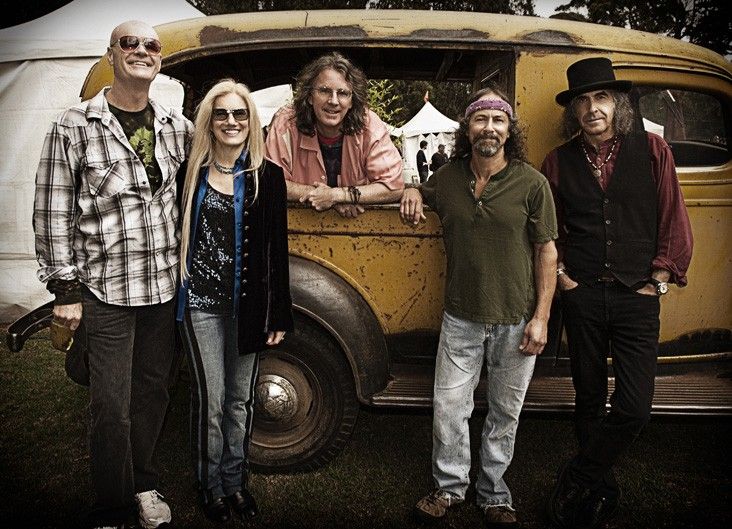Interview: S.F. rock band Moonalice a blend of hippies, venture capitalists

Moonalice, courtesy.
This story originally appeared in the Oakland Tribune.
It turns out that fronting a rock band is similar to running an investment firm. Just ask 54-year-old Moonalice frontman and businessman Roger McNamee, a founding partner — along with U2’s Bono — of the venture capital firm Elevation Partners.
Moonalice
in concert
SAN FRANCISCO UNION SQUARE: 6-8 p.m. Wednesday; free
MORAGA SUMMER CONCERT SERIES: 6:30-8:30 p.m. Thursday, Moraga Commons Park, Moraga and St. Marys roads; free
MORE INFORMATION
“Music is a business where the most gifted people emerge very early,” McNamee says. “It’s also a business that rewards hard work and persistence and enthusiasm. It turns out if you never lose the dream, you can have a great career even if you aren’t successful in your 20s.”
There are two Roger McNamees. There’s the one who climbed up the ladder at T. Rowe Price and cofounded private equity firm Silver Lake Partners before Elevation Partners. Then there’s the “Chubby Wombat Moonalice” version of McNamee, who sings songs such as “It’s 4:20 Somewhere” across the country.
The psychedelic rock and blues jam band, which features former members of Jefferson Airplane and musicians who have played with some of the biggest names in rock, has three local performances coming up, including two this week in San Francisco and Moraga.
“Most people like me would be contributing to the symphony,” he said. “I prefer to make our own little symphony.”
McNamee has been playing music most of his life. While starting out at T. Rowe Price, he and his brother had a duo called the Other Brothers that played cover songs at bars and ski-lodge happy hours on the East Coast.
As McNamee attended various tech trade shows in the ’80s, he realized that many attendees — who later would become titans of the business world, such as Microsoft cofounder Paul Allen — liked to get together in their spare time and jam.
“There were tons of great musicians at Microsoft and Apple,” he said. “I got to know them as a musician as well as an analyst. Music mattered intensely in my professional life.”
The duo later added a bassist and a drummer and became the Flying Other Brothers because McNamee’s brother had to commute cross-country for gigs.
McNamee’s band gave him access to the music world, and he soon found himself advising the Grateful Dead about technology. Through this relationship, he met Jefferson Airplane guitarist Jorma Kaukonen, who would run the band through several rock ‘n’ roll boot camps — McNamee’s idea, as he wanted the Flying Other Brothers to become more cohesive.
The camp instructors included Jefferson Airplane bassist Jack Casady and keyboardist Pete Sears, as well as Hall & Oates and Bob Dylan guitarist G.E. Smith.
All three later joined Moonalice, although Smith has since backed out. McNamee’s brother eventually left, and the band was rounded out with drummer John Molo, who has played with Phil Lesh and John Fogerty, bassist Barry Sless and McNamee’s wife, Ann, on keyboards.
In 2006 McNamee went to his friend, producer T Bone Burnett, and asked him to produce a record for the Flying Other Brothers.
“He said he would make an album for us if we ended our old band “… and started over with a new band, new music and a new legend,” McNamee said.
The “legend,” or faux-backstory, is that Moonalice descended from an American Indian tribe who later became hippies. Band followers are called “the tribe.”
“Music was much more adventuresome then than it is now,” he said. “We miss the whole sense of adventure. We’re more like the Grateful Dead parking lot than the inside of a show. That’s the vibe we were looking for.”
The band’s self-titled album sold horribly, so the follow-up, “Free,” was given away.
“Next thing I know, we’re up to 200,000 downloads in 2½ months,” he said.Like any investment, it’s important to McNamee the band makes money. Moonalice plays about 110 gigs each year, everywhere from the Oregon Country Fair to Bonnaroo.
“It’s a very serious professional endeavor,” he said. “We practice like crazy and we try to innovate like crazy.”
Just don’t ask him to choose between the music and investing businesses.
“For 28 years, I have intensely focused on investing; I can’t get it out of my blood,” he said. “I don’t know how good (a musician) I can become, and I like the idea of finding out.”
Follow editor Roman Gokhman at Twitter.com/RomiTheWriter.
